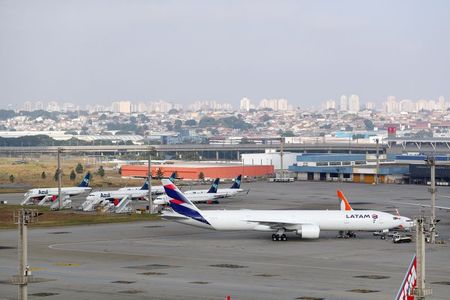By Marcelo Rochabrun
SAO PAULO (Reuters) – Brazilian bus company Itapemirim is launching a new airline in June, betting it can dodge the financial ruin that has grounded many rival carriers even though the land transport company just spent five years reorganizing under bankruptcy protection.
The carrier expects to have a fleet of 50 Airbus A320 planes by next year, all painted in Itapemirim’s signature bright yellow color, trying to beat the odds that have led 11 airlines to fail in Brazil so far this century.
“We have the intention of being the largest airline in Brazil, with all due respect to our competitors,” said Sidnei Piva, president of Grupo Itapemirim, which will emerge from bankruptcy this month.
“We are not going to stop at just those 50 aircraft, we plan to multiply that number several times.”
Key to its business pitch is selling tickets that mix air and bus travel, lowering travel time between Brazil’s smaller cities without adding much to the cost.
The idea of a bus company starting an airline is not as unusual as it might seem in Brazil, where the founders of country’s largest carrier Gol Linhas Aereas Inteligentes also made their initial fortune in bus transport.
But Gol and Brazil’s other main domestic carriers, Azul SA and LATAM Airlines Group are struggling because of their large debt and low liquidity – worsened by the pandemic’s severe blow to demand.
LATAM filed for bankruptcy last May, while Gol and Azul drag a combined 33 billion reais ($6.27 billion) in accumulated losses.
Still, a rival with a clean balance sheets could upend the market, analysts say. Piva said Itapemirim does not have debt payments for the next four years and is running on a $500 million investment from a United Arab Emirates sovereign fund that he declined to name.
Piva added that Itapemirim will not follow the ultra low-cost model that is in vogue now but will instead focus on a high quality of inflight service, generous leg room and free checked bags.
Rivals in Brazil and the rest of the world have generally moved away from that model, lowering ticket prices but then selling other services as add-ons.
($1 = 5.2662 reais)
(Reporting by Marcelo Rochabrun; Editing by Marguerita Choy)





